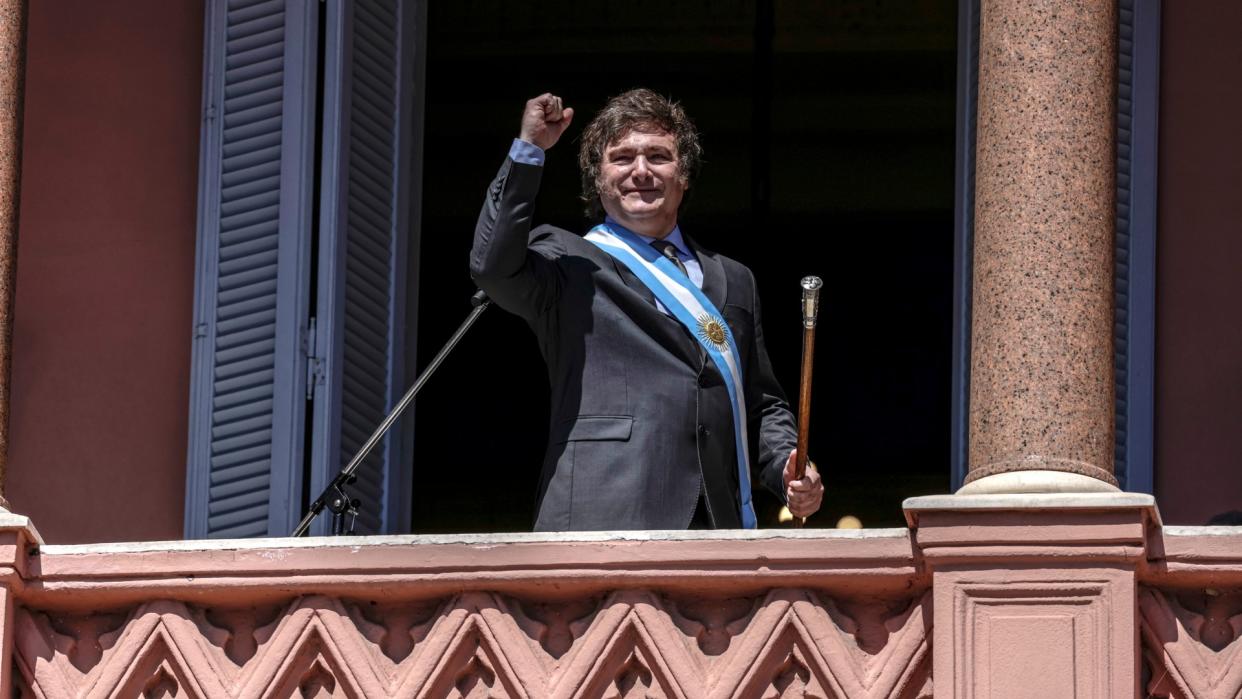How Argentina's new far-right president could give his country 'shock treatment'

- Oops!Something went wrong.Please try again later.
Argentina has a new leader: Javier Milei was inaugurated as the South American country's president on Sunday. Milei, a populist and far-right libertarian, shot to stardom from relative obscurity amid anger over the nation's dire economic circumstances. To deal with these issues, Milei said during his inaugural address that there was "no alternative to shock treatment."
This "shock treatment" would seek to combat Argentina's longstanding economic crisis. The country is dealing with inflation of 143% — widely cited among the highest in the world — along with $43 billion in debt and four in 10 Argentines living in poverty. In his inaugural address, described by The Associated Press as "[not] the most uplifting," Milei laid out his plans for the country, including mass spending cuts across government agencies in an effort to combat hyperinflation and self-described "anarcho-capitalism."
But many Argentines are wondering just how Milei will go about implementing his "shock treatment" and what it means for them. The AP noted that people across the country are also wary of which version of Milei they will get going forward: "the chainsaw-wielding, anti-establishment crusader from the campaign trail, or the more moderate president-elect who emerged in recent weeks."
A 'hail Mary plan'
Milei is "really trying to remake the Argentine government in Argentina itself in his libertarian view of the world," The New York Times' Jack Nicas reported for the outlet's flagship podcast, "The Daily." This mostly includes a massive reduction in the size of Argentina's government and central banking system — Milei has proposed eliminating 10 out of 18 government ministries and has previously said he will "take a chainsaw to the state."
The new president has created a "hail Mary plan to rescue" Argentina's economy, Sabrina Tavernise said for the Times. But the central part of his economic campaign is a plan to eliminate the Argentine peso and "use the U.S. dollar as Argentina’s national currency." American currency is already highly embedded in Argentina's economy, as Nicas noted that the country "is already deeply comfortable with the U.S. dollar and is already using a lot of U.S. dollars, and Milei "basically wants to formalize that."
However, it's estimated that Argentina needs an additional $30 to $40 billion in U.S. currency to formally dollarize. This "could be a big problem for Milei and his plans," Nicas opined, because as a result of Argentina's current debt, "they basically have zero."
This plan is part of some "disconcerting policies" that Milei has floated, David Riedel of the think tank Riedel Research Group told CNBC. There could be "unintended consequences" of dollarization, and it "would not cure the main issue in Argentina, which is a really large fiscal problem," Elijah Oliveros-Rosen, chief economist for emerging markets at S&P Global, told Reuters.
The 'best and last chance'
Milei's campaign promises would mean that many Argentines — including those in poverty — "would be subjected to significant austerity," business journalist Stephen Bartholomeusz wrote for The Sydney Morning Herald. While dollarization would help dampen inflation, "it would cause financial shocks" and the shutting down of the peso printing presses "would almost certainly plunge the economy into recession," Bartholomeusz added.
Given Argentina's history of monetary mismanagement, Milei's plan "will be a bold but risky attempt to undo the legacies of decades of poor government," Bartholomeusz said. But it may also be the country's "best and last chance of breaking free of a destructive cycle."
But doubts continue to arise in Argentina "about what kind of government the notoriously erratic economist might lead and what measures he would announce in the coming days," Tom Phillips and Facundo Iglesia wrote for The Guardian. While the changes will be dramatic, one Milei supporter told The Guardian that Argentina could "either turn around completely or we are going to sink like the Titanic" and that the population "have to sacrifice ourselves … if we are to see light at the end of the tunnel."
Not all of Milei's government-busting plans are going to be implemented right away — including, it appears, his plan for U.S. dollarization. Despite touting the agenda for weeks after winning the election, Milei chose a former head of Argentina's central bank to lead the organization's dollarizing efforts. But that person declined the job amid signs that Milei "is backing away from his flagship policy of dollarizing the sickly economy," the Financial Times reported.

